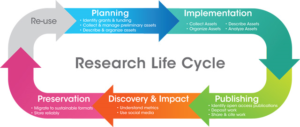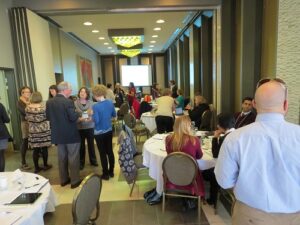by Virginia Wilson, Director
Centre for Evidence Based Library and Information Practice (C-EBLIP_
University of Saskatchewan, Canada
[This post was originally published on the LARK Library Applied Research Kollektive blog on August 31, 2017.]
Many information organizations strive to create a culture of research for different reasons. Some, like many Canadian academic libraries, do so to encourage their librarians who are required to conduct and disseminate research for professional advancement, i.e. tenure, permanent status. Others have embraced evidence based library and information practice (EBLIP) where research alongside professional expertise and what the users want/need is prevalent. Still others see research as an important part of librarianship where research can inform practice. And then there are combinations of the above. Indeed, our own University Library has spent the last 10 years developing a robust culture of research, where research and scholarly activity are supported and encouraged, as librarians are faculty members and on the tenure track. We also consider the tenets of EBLIP in our practice of professional skills.
However, many librarians do not have extensive training in the research enterprise. Library schools offer the obligatory research methods survey class and unless the librarian also has another graduate degree or opts for the thesis route in library school, research experience is not a given. So, when a librarian comes into a culture of research, it can be daunting and frustrating no matter what supports are offered and a common difficulty for new librarians is trying to think of or decide on a research topic. It seems to look (simplistically1) like this (click on charts for a clearer view):

Even though we ask candidates about their research interests, often the idea of the actual doing of research doesn’t hit home until the candidate is faced with the realities and requirements of the tenure process.
The research life cycle2 looks something like this:

This seems to be a robust and thorough depiction of the research process (although I might use the term “data” instead of “assets” in the Implementation box). I like how this process encourages open access publishing and includes social media as a source of impact metrics. It’s good stuff. But nowhere in this process is there a description of coming up with a research topic. It presumes that the topic is there and the research question is already at hand.
I wonder then if the idea of a “culture of research” is too late in the game. There are many different cultures an information organization can strive to create: culture of learning, culture of excellence, culture of success, but what about a culture of curiosity?
A culture of curiosity is in line with encouraging research amongst librarians as researchers. As defined by Merriam-Webster, curiosity is interest leading to inquiry. Fostering a culture of curiosity with the implicit and explicit aim of curiosity leading to research allows the research piece to be part of the natural process of having a question and seeking an answer. A culture of curiosity would look something like this:

Research, therefore, would be part of the process – just not the starting point.
But if the organization requires research and indeed it is part of a librarian’s job, that fact cannot be ignored. Can a librarian put that requirement to the back of their mind and go into their job all wide-eyed and curious? Surely there will be the looming spectre of research outputs and then the pressure to be curious in the right way – a way that will lead to an answerable research question. I don’t deny that the scenario could happen, and I’m not trying to institute tricking your employees into doing research as an active strategy. I believe we can have both a culture of curiosity and a culture of research, and that they will build on one another moving forward. Curiosity leads to questions which lead to research which can lead to innovation. An added bonus of working within a culture of curiosity is that curiosity will also increase employee engagement and provide the continuous impetus to examine and reflect on the work so to be open to innovation.
How does one develop a culture of curiosity? Obviously, having management that is on board with such a culture is important. However, in browsing around about this topic, I compiled four ways to encourage curiosity that anyone can try:
- Write agendas as questions: using the premise that employees are more engaged when they feel like they can influence the outcome, set up meetings that are as participatory as possible and encourage interest by structuring agendas in the form of questions.
- Encourage collaboration: because great ideas don’t generally happen in a vacuum, have employees work together often and in different groupings. They will be exposed to the talents of their co-workers and can take advantage of cross-unit ideas and inspiration.
- Get rid of fear by embracing failure: research and publishing can be a hot bed of disappointment. Harsh peer reviews, rejection letters, uncooperative methodologies – there are many ways to find yourself down the wrong path. An organization that calmly accepts that failure is a part of progress will enable employees to move on to the next thing faster and with confidence.
- Encourage questioning: while it is true that constant questioning has the risk of causing defensiveness, realistic questioning of policy and processes can help to stimulate new ways of thinking and new ways of doing the work. This is also the place where research topics are born.
A culture of curiosity will benefit not only the librarians who have research as a mandate, but also all the library employees who are working in the information organization and the organization itself. Encouraging curiosity, creativity, and innovation can help in a sea of constant change. And in our fast-paced work world, keeping pace with or ahead of change will serve us all better. And if a research mandate is on the table, curiosity is a must to achieve something relevant and useful.
Works consulted
Goodman, R. (2016, June 1). How to build a culture of curiosity [Blog post]. Retrieved from https://www.rickgoodman.com/build-culture-curiosity/
Kalra, A.S. (2015, October 23). 10 ways to build a culture of curiosity. Harvard Business Review. Retrieved from http://www.humanresourcesonline.net/10-ways-build-curious-company/
Karl, A. (2013, November). Create a culture of curiosity: guest blog by Allan Karl. [Blog post]. Retrieved from https://marksanborn.com/create-a-culture-of-curiosity-guest-blog-by-allan-karl/
Milway, K.S. and Goldmark, A. (2013, September 18). Four ways of cultivating a culture of curiosity [Blog post]. Retrieved from https://hbr.org/2013/09/four-ways-to-cultivate-a-culture-of-curiosity
1I say simplistically up above because of course candidates at our library know prior to being hired that they must do research. We focus on it specifically during the hiring process to avoid blindsiding someone coming in.
2“Research Life Cycle” image from UC Irvine Library Digital Scholarship Services Found on University of Michigan Scientific Discovery Path of Excellence – An Information Resource Starter Kit http://guides.lib.umich.edu/DiscoveryPoE
This article gives the views of the author and not necessarily the views the Centre for Evidence Based Library and Information Practice or the University Library, University of Saskatchewan.





